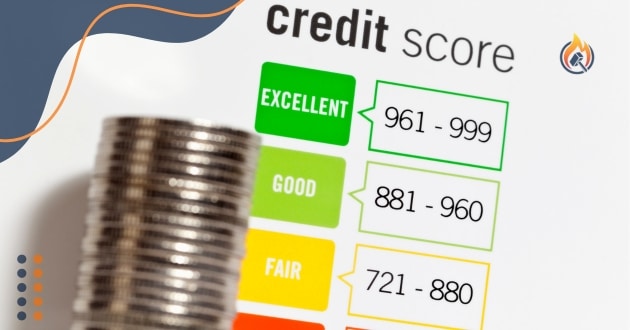How to improve credit score in Canada is a question many Canadians face at some point in their financial journey. Whether you’re just starting out with credit, looking to rebuild your score, or aiming to enhance your current credit standing, understanding the process can lead to greater financial freedom.
A strong credit score plays a pivotal role in unlocking better financial opportunities, including low-interest rates on loans, favorable terms on credit cards, and more.
Your credit score is based on a variety of factors, including your payment history, credit utilization, and the length of your credit history. Therefore, learning how to manage these factors effectively can lead to a significant improvement in your credit score.
Whether you are a newcomer to the country, someone who has experienced financial setbacks, or someone who is simply looking to optimize their credit health, this article will provide the necessary tools and insights to help you achieve your goal.
Understanding Credit Scores in Canada
Before diving into the strategies on how to improve credit score in Canada, it’s essential to fully understand what a credit score is and how it impacts your financial life.
A credit score is essentially a numerical representation of your creditworthiness, determined by your past credit behavior. In Canada, credit scores typically range from 300 to 900, and a higher score indicates a lower risk for lenders, which often results in better interest rates and more favorable loan terms.
Firstly, the three main credit bureaus in Canada, Equifax, TransUnion, and Experian, collect and analyze information about your credit history to calculate your score. The data used includes your payment history, the amounts you owe, the length of your credit history, and other factors.
While a higher score makes it easier to qualify for loans, lower interest rates, and even favorable rental agreements, a poor credit score can make it more difficult to access credit or result in higher borrowing costs.
Moreover, understanding the different ranges of credit scores can help you gauge where you stand and what actions are needed. A score of 750 or above is generally considered excellent, 700-749 is good, 650-699 is fair, and anything below 650 is considered poor.
However, a poor score is not permanent. Through consistent effort and the right strategies, such as paying your bills on time and reducing high-interest debt, you can improve your credit score in Canada.
In parallel, while working on improving your credit score, consider incorporating other financial strategies, such as tips for reducing household expenses, which can help free up money to pay down existing debts.
Reducing unnecessary expenses allows you to focus more on saving and paying off debt, ultimately contributing to a healthier financial profile and a better credit score.
Why Your Credit Score Matters
A good credit score is more than just a number. It influences your ability to secure loans, mortgages, and credit cards at favorable interest rates. On the other hand, a poor credit score can result in higher interest rates and difficulties in securing financial products.
Thus, improving your credit score in Canada should be a priority if you want to access better financial options and take control of your financial future.
Factors How to improve credit score Canada
To effectively improve your credit score, it’s important to first understand the key factors that influence it. Here are the main elements considered by credit bureaus:
- Payment History (35%): Your payment history is the most significant factor in determining your credit score. Timely payments on credit cards, loans, and other forms of credit reflect positively on your score.
- Credit Utilization (30%): Credit utilization refers to the percentage of your available credit that you’re using. A lower credit utilization ratio is favorable. For example, if your credit card limit is $5,000, it’s best to maintain a balance of no more than 30% of that limit to avoid negatively affecting your score.
- Length of Credit History (15%): A longer credit history indicates to lenders that you have experience managing credit. This factor takes into account the age of your oldest credit account and the average age of all your accounts.
- New Credit (10%): Opening several new credit accounts in a short period can be seen as risky behavior. Each time you apply for credit, it results in a hard inquiry, which can lower your score temporarily.
- Types of Credit in Use (10%): A mix of different types of credit, such as credit cards, mortgages, and personal loans, can be beneficial for your score. However, having too many credit accounts can also be detrimental.

Steps How to improve credit score Canada
Now that you understand the factors affecting your credit score, here are actionable steps you can take to improve your credit score in Canada.
- Pay Your Bills on Time: As mentioned earlier, your payment history has the biggest impact on your credit score. Therefore, the most important step you can take is to pay your bills on time. Set up reminders or automatic payments to ensure you never miss a due date. If you have missed payments, try to get back on track as soon as possible. Even if you can’t pay the full amount, making partial payments can help reduce the damage to your score.
- Reduce Your Credit Card Balances: One of the most effective ways to improve your credit score in Canada is to reduce your credit card balances. High credit utilization can negatively impact your score, so aim to keep your utilization below 30%. Consider paying off your credit card balances as soon as possible, or, if you can’t, focus on paying down the cards with the highest interest rates.
- Avoid Opening New Credit Accounts: Every time you apply for credit, it results in a hard inquiry, which can lower your score temporarily. If you’re looking to improve your credit score in Canada, try to avoid applying for new credit unless absolutely necessary.
- Check Your Credit Report Regularly: Your credit report contains a detailed record of your credit history, including information about your accounts, payment history, and any negative marks. It’s essential to check your credit report regularly to ensure there are no errors or fraudulent activity. If you notice any inaccuracies, dispute them with the credit bureau to have them corrected.
What to Do if Your Credit Score Is Already Low
If your credit score is already low, don’t worry—there are several steps you can take to improve it over time. Start by reviewing your credit report to identify any missed payments, outstanding debts, or inaccuracies.
This will help you focus on the specific areas that need attention, such as resolving overdue payments or disputing any errors. Taking immediate action to address these issues is crucial in beginning to rebuild your credit score.
Next, prioritize paying down high-interest debts, particularly credit card balances. Keeping your credit utilization under 30% is a key factor in improving your score.
Avoid opening new credit accounts, as hard inquiries can temporarily lower your score. Instead, concentrate on managing your current accounts responsibly by making timely payments and staying within your credit limits.
Finally, consider applying for a secured credit card if you have limited or no credit history. This type of card allows you to build credit by making a deposit that serves as your limit.
Regularly monitor your credit score to track your progress and stay on top of any changes. For more guidance, visit Canada.ca – Financial Consumer Agency of Canada for additional resources to help you improve your credit score.
Conclusion
In conclusion, improving your credit score in Canada is achievable with the right knowledge and strategies. By paying your bills on time, reducing credit card balances, avoiding unnecessary credit applications, and regularly checking your credit report, you can gradually improve your score.
Keep in mind that it takes time and consistent effort, but the benefits of a better credit score are well worth it, including access to better financial products and more favorable terms.
By following the steps outlined in this article, you can take control of your credit and work toward building a solid financial foundation for your future.


